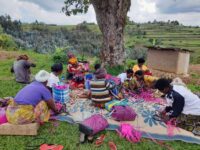I recently spoke with a sponsor about gift giving. I explained that he could send a monetary gift for his child, and one of the program staff would take his child to the market and help them purchase what they would like.
 The sponsor replied, “So you actually have staff in her community? Someone close by that can take her to the market?”
The sponsor replied, “So you actually have staff in her community? Someone close by that can take her to the market?”
You may laugh, but this is a common question. Our purpose and mission may be well understood (to release children from poverty in Jesus’ name), but new and veteran sponsors alike have trouble understanding what our program looks like once implemented in a community.
When your sponsored child attends the child development center, or CDC, he or she is actually visiting a local church with whom we have partnered. This partnership is what sets us apart from other sponsorship organizations. Our desire is to support the church to complete its God-given mission (Matthew 16:18). We believe that this partnership is a strategic catalyst for community change — starting with changing one child’s life.
We depend on the church in your sponsored child’s community to carry out our program. We, with the help of sponsors and donors, provide them with finances, guidance and accountability in order to make the program a success. According to the needs in their community, church leaders establish guidelines for what they will provide to the children registered at their center.
These guidelines are established according to our standards of holistic child development, individual child attention, use of a national or Compassion-approved curriculum to meet our desired outcomes, a commitment to a one-to-one sponsorship (one child to one sponsor), meeting a time requirement for engagement with the children, and adhering to an attendance standard.
To ensure that the program is effective and funds are used wisely, the church is audited, at minimum, once every 30 months. Each CDC is visited by a Compassion staff member from the field office a minimum of three times per year.
Currently we partner with more than 5,000 churches worldwide, serving about 1.2 million children through our Child Sponsorship Program, and more than 21,000 mothers and babies through our Child Survival Program.







16 Comments |Add a comment
my sister is working in church she is a director in a compassion…she is also a compassion child before…by this she is now a part of a compassion worker…ilike this compassion cause it can help for educate children…it helps also there life style
Very helpful to me. Good article. Well written.
Shaina, I am planning on visiting my child inTZ 961… How do I get info on how to best spend my time there ?
You’ll want to get in contact with our visits team to find out more details. You can start the individual visit process here: https://www.compassion.com/get-involved/individual-visits.htm
Thank you Kees for your inspirational information. It is so good to know how important our letters are to the children. I mean, you’ve been there and experienced it, thank you for sharing.
You’re welcome, Kim and Lindy. This was such a great post. Shaina did such a good job explaining it. BTW, Shaina, my mom just took a turn for the worse again. It’s tough…. She had another small heart attack, but she didn’t feel pain. It was like she fell asleep.
I really like this blog. It is right on. I sort of changed my mind on something this summer. I used to see the Compassion projects as a project with a church connected to it. I.e. the project was the big thing. When I started spending more time with the projects, I noticed that these were really churches that were hosting Compassion programs.
For instance, the churches have other things going on besides the Compassion program. The Compassion program is one of their ministries, though probably one of their main ministries.
One LDP student of a church invited me to join them for their “superheroes” party. It was an outreach to the lost. Many youths were dressed up as some sort of superhero… At the event were some Compassion children, but many of the youths weren’t in the Compassion program. Maybe their parents were too well off to be part of it. Nevertheless, they were an integral part of that church and some of their friends were in the Compassion program.
So, the church might have other ministries. They might even use the project buildings for this. Also, the staff that works at the project programs aren’t Compassion paid staff, they are paid by the local church to work there and teach there.
I don’t know much about the AWANA program, but sometimes, I think that that is about as close to what Compassion does as I can think of. The church puts on an AWANA program and many of the youths of that area get involved. But it is the church….
So, I see Compassion as a facilitator in many ways. It facilitates us as sponsors to be able to have a church disciple one child, so that child will become an effective Christian adult. And we get to be a big part in that through the letters and prayers and if we want to visit that child.
I am also so thankful for the staff that works at these projects, because they are sacrificing so much and they are far from rich, but they are doing what they can to help these precious children.
Kees, I really appreciate your comment on this excellent Blog! I’m sure your time in Bolivia has allowed you to see from a completely different perspective than those of us who have never been able to spend time at a project. We really value your insights!
Hi, Lindy, I know it’s funny, but I knew it, but I didn’t know it experientially, if that makes sense. Another thing that I really experienced was how important each individual sponsor is to that project. They really look up to the sponsors. And when your letter gets there, it gets treated with the highest respect. The same at the country office. Those letters are treated with such importance. I’ve heard the same at the office in Colorado Springs. For instance, if a picture arrives at the country office and it doesn’t have the name or number of the child or the sponsor’s name or number, the country office will do everything to try to find out who that picture is from and whom it is meant for. Of course, with 1000 letters arriving there, it can be a bit difficult, but they’ll do whatever they can. (That’s not to encourage people to not at least write the number of the child on the back of the picture!) Also, I was talking to the director of BO523 in Cochabamba. (If you sponsor in that project, you did well!) Anyways, we got to be good friends. One day, we were walking to some house that she had to go to. So, we were just chatting. I sort of asked her, if she wanted to be a director for the rest of her life, since she was fairly young. She was 25 years old and she has a Master’s degree. (Did I tell you that these staffworkers were well qualified) Anyways, to make a long story even longer. She said “No.” I sort of was suprised at that answer. I asked her what is that you want to do besides this. She said, her biggest desire in life is sometime in the future to be able to sponsor a child. That was her big dream in life…. I was floored.
So, that’s why the letters are so important. The child really looks at the sponsor like his or her big hero!!! And most of these children or young people or LDP students for that matter, if you were to ask them what their biggest dream in life would be, it would be to meet their sponsor. That’s why the sponsor is in such an amazing position to really speak God’s Word into the lives of their sponsored children. They listen to the sponsor.
But anyways, I’m really getting off topic! LOL
I work as a staff in one of the project here in the philippines.. and i absolutely agree on what you said about letters. Our kids are greatly influenced by the encouragement of their sponsors through their letters. and this is helps the parents and family of the kids. One family does not go to church unless its monthly meeting but when they recieved a letter from the sponsor of their son encouraging them to go to church, they did.. and they are still going until now. Praise the Lord!
On a recent Compassion trip to Honduras, this is one of the things that I gained a greater understanding of. I loved how the head of Compassion Honduras explained to us that you won’t see “Compassion” signs all over the churches and buildings, they don’t build new buildings and start new programs – that wouldn’t be fiscally responsible and it would undermine what the churches are already doing. Instead, they partner with existing churches already invested and involved with the children and families in their community, and support the local church as it fulfills it’s mission work.
These churches, these Compassion assisted churches… amazing leaders, amazing ministry — so vibrant and life changing in these communities.
I know that Compassion is making a difference in Honduras. I only wish the programs worked in the neighborhoods where I am currently working. Go compassion!
I have only recently found out about Compassion International. I really like the fact that you tak a holistic approach to the needs of children and you are empower local leaders and churches to carry out the mission.
I agree with Megan. This is one of the components of Compassion I really like too. Ministering through the local body has far-reaching impacts. I know people can argue that it keeps Compassion out of non-churched countries (a valid point), but there are other world relief programs that minister in those countries. I like that Compassion has this as a distinctive.
Yes, this is also what I love about Compassion, is it’s partnering with locals churches. When we serve within the simple parameters found in the bible, things can work so much more naturally and effectively!
This is one of the things that I REALLY like about Compassion: partnering with the local church. After all, who better to know the needs/understand the circumstances than friends and neighbors? Kudos to Compassion for their fiscal responsibility as well!